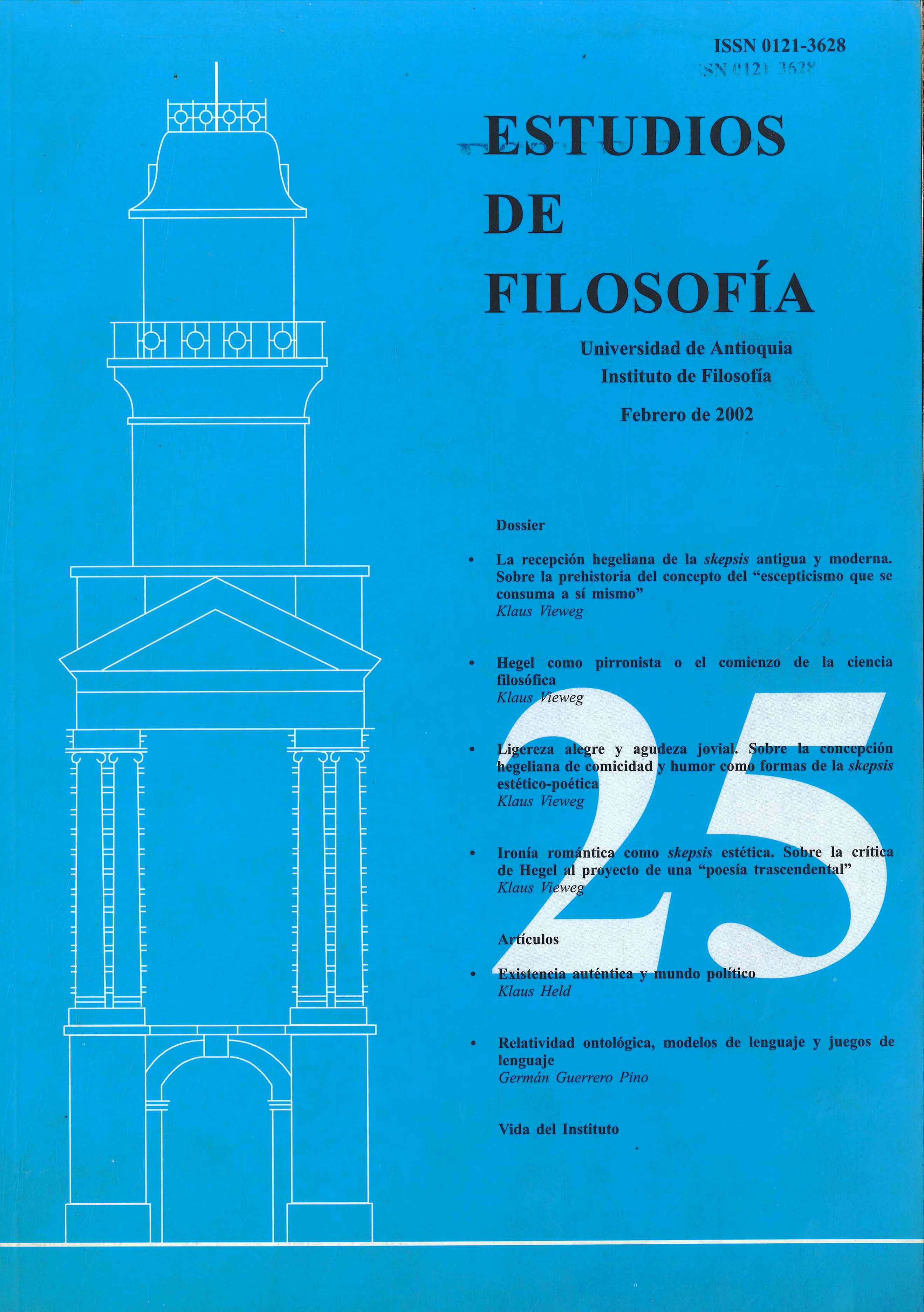Joyful lightness and jovial insightedness. On Hegel’s idea of the comic and the humoristic as forms of a aesthetic-poetic skepsis
DOI:
https://doi.org/10.17533/udea.ef.14988Keywords:
Humor, the comic, novel, subjectivity, self-relationAbstract
Ancient Pyrrhonism resembles a sphinx. It claims to be a way of life and thought, a narrative on how the individual is to live his life, and a principle against any sort of dogmatism. In so far as it declines to make any definite st atement, Pyrrhonism typically entails a trend towards narrative and sits in the border between Philosophy and Literature. In his Lectures on Aesthetics, Hegel considers the comic and humor as forms of the poetic-literary Skepsis and defines the modem humoristic novel as the supreme form of art. The Life and Opinions of Tristram Shandy, Gentleman, the novel by Lawrence Sterne, serves as the paradigm of "negative", i.e. anti-dogmatic, humoristic fiction. It is also the base for Modem subjectivity, as overcoming of the freedom ofthe character, in the way preached by Pyrrho. Modem subjectivity demands a total skepsis. Otherwise, even the concept of Subjectivity itself is unconceivable. Besides, unless there is freedom for humor, it is impossible to have a fair idea of what it means to be free. Il is in this sense that Modernity is the epoch of poetic and philosophical Skepsis. It is also the time of its inclusion. Tristram Shandy constitutes the paradigm of Representing Self-relation while the Phenomenology of the Mind constitutes the paradigm of Thinking Self-relation. Hence, Humoristic Subjectivity and Thinking Subjectivity could be s aid to be the paradigms of Modern Literature and Philosophy, where Pyrrhonism is "overcome "
Downloads
Downloads
Published
How to Cite
License
Copyright (c) 2002 Klaus Vieweg

This work is licensed under a Creative Commons Attribution-NonCommercial-ShareAlike 4.0 International License.
Authors who publish with this journal agree to the following terms:
1. The Author retains copyright in the Work, where the term "Work" shall include all digital objects that may result in subsequent electronic publication or distribution.
2. Upon acceptance of the Work, the author shall grant to the Publisher the right of first publication of the Work.
3. The Author shall grant to the Publisher a nonexclusive perpetual right and license to publish, archive, and make accessible the Work in whole or in part in all forms of media now or hereafter known under a Creative Commons Attribution-NoCommercia-ShareAlike (CC BY-NC-SA 4.0), or its equivalent, which, for the avoidance of doubt, allows others to copy, distribute, and transmit the Work under the following conditions: (a) Attribution: Other users must attribute the Work in the manner specified by the author as indicated on the journal Web site;(b) Noncommercial: Other users (including Publisher) may not use this Work for commercial purposes;
4. The Author is able to enter into separate, additional contractual arrangements for the nonexclusive distribution of the journal's published version of the Work (e.g., post it to an institutional repository or publish it in a book), as long as there is provided in the document an acknowledgement of its initial publication in this journal;
5. Authors are permitted, and Estudios de Filosofía promotes, to post online the preprint manuscript of the Work in institutional repositories or on their Websites prior to and during the submission process, as it can lead to productive exchanges, as well as earlier and greater citation of published work (see The Effect of Open Access). Any such posting made before acceptance and publication of the Work is expected be updated upon publication to include a reference to the Estudios de Filosofía's assigned URL to the Article and its final published version in Estudios de Filosofía.















